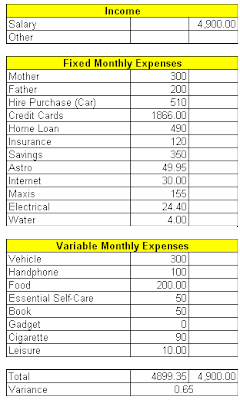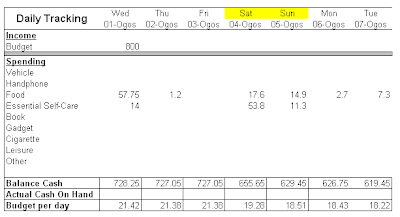Put away a small amount each month. Better still, set up a standing instruction for automatic deduction so you don't have to think about it. Put the money into a savings account that rewards you with higher returns – you can check the list that I have put here on savings account.
You may consider these steps, develop the saving habit and you will soon see the pay-off. You'll see the benefit of saving as you watch your bank balance grow.
As your savings grow, you'll soon find that you may not need to use your credit card so often. In long term, you may even be able to achieve more substantial goals, such as having a deposit for your dream house.
Have a small amount deducted from your salary and deposit it directly into another saving account. As time past, your savings will grow automatically without you having to do a thing.
Why save?
In the short-term, having savings will free you from the stress of living from one payday to the next. Having some money set aside helps you deal with large bills or unexpected expenses. If you use your savings rather than borrowing money, you do not have to worry about repaying the sum you borrowed and any additional fees. On top of this your savings account may also earn a return for you. Saving for big expenses instead of using a credit card has dual benefits – you see your savings grow and you don't pay anything on the credit card.
As your savings continue to grow, you’ll be able to think beyond day-to-day expenses and would afford you larger things, like a holiday, a new i-pod or a car, without going into debt.
Set yourself a goal by setting up a standing instruction for an automatic deduction from your salary account, sit back and watch your savings grow.
How to get started? It’s as simple as 1, 2, 3 ....
No. 1 : Set goals and determine your budget
Use your goals to motivate you. You can save for your next holiday, your wedding, a dream house or even for your retirement.
Break them down to short, medium and long-term goals.
In the medium-term, you can save larger amounts for things like a deposit for a house. As for long term, you may achieve your goal and have better options to retire. If you opt to have an option of early retirement, you may consider allocating a portion of your savings in investments that enable your fund to grow.
You can start saving now even if you haven't had time to work out a budget. Just pick a small amount to set aside from your salary each month. Some people choose a set percentage of their salary - say 5% or 10%. Others save a standard amount such as $30 or $50. It doesn't matter if you start small. The aim is to get into the saving habit now.
Request for your salary to be automatically credited into your savings account each month. This takes the work out of saving as you won't have to remember to put the money away.
A budget can help you to plan for your saving and expenses. Aim for specific goals. In the early days, keep your plan simple. For example, you may plan to have sufficient amount to pay for the big bills you get every quarter. Or you could plan for a longer term which will save you enough over a year to pay for a holiday. Use a budget to help you plan ahead.
No. 2 - Keep track of your spending
Keeping a spending record is the best way to establish your budget. Carry a notebook in which you record all your expenditure – every item, no matter how small. You’ll be surprised to find out where the money goes... cut down on the latte or cappuccino factor! Small amounts of money you spend on posh coffee or cigarettes can add up to thousands of ringgit a year. Cut back and put this money into your savings account and watch your money grow.
Check bills and keep receipts. Studies estimate that, on average, every fifth bill from the supermarket contains inaccuracies. So check every bill you get, from your mobile phone service provider to your electricity bill.
Avoid the “sale” mentality. Buying something for $100 which has a 50% tag doesn’t necessarily save you money if you don’t really need it. The point is, buy only what you need, not what you want or not what you think you can afford.
No. 3 - Where to save?
Typical savings products include savings accounts, special purpose accounts and term deposit accounts.
Savings accounts
- Allows withdrawals whenever you need to (may be subject to daily limits)
- Rates may vary
- May offer benefits (eg higher rates, reduced fees) if the balance stays above a minimum amount
- Can be useful for day-to-day transactions and short-term saving (eg for utility bills)
- You can't withdraw the money until the maturity of the term which ranges from 30 days to 5 years
- Higher rates than transaction accounts and the rate in fixed deposit accounts is fixed for the duration of the term. Profit is a potentially higher rate for the stipulated tenure
- Can be useful if you've saved a bit of money that you want to keep for a future goal - a term deposit account will prevent you dipping into the money sooner than you had planned and will pay more returns than a savings account





















